新概念英语第一册9192课完整
合集下载
(完整版)新概念第一册Lesson91-92
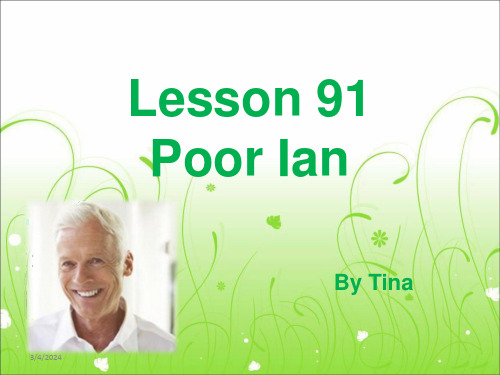
come to work→work等
• 现在完成时可表示持续到现在的动作或 状态,动词一般是延续性的,如
• live, teach, learn, work, study, know.
• 过去时常用的非持续性动词有: • come, go, leave, start, die, finish,
become, get married.
特疑词+ have (has)+主语+p.p?
(2) 表示动作发生在过去某个不确定的时间, 但对现在留下了某种影响和结果。 常被just、already、yet 等副词修饰。
-Have you had lunch yet? 你(已经)吃午饭了吗? -Yes, I have. I‘ve just had it. 我刚刚吃过。(现在我不饿了)
(强调动作,过程)
move out (of) 搬出来
move away
搬走
move from…to…
从…搬到…
②感动,打动
This story moved me. 这个故事感动了我。 The news moved him very much. 这消息使他很感动。
Байду номын сангаас
★ miss [mis] v. 想念,思念
★ person ['pə:sən] n. 人
He is a nice/good person. 他是个好人。 in person 亲自,直接的 He will go to get the money in person. 他将亲自去取钱。
★ personal adj. 个人的,私人的
['pə:sənəl]
• The patient is lying still. • 病人安静地躺着。
新概念英语第一册9192完整版

• 她46岁时仍然美丽。 ② adv. 还要,甚至更
• She looked very ill last week and this week looks still worse.
她上周看起来病得很严重,这周更严重了。
③ adv. 静止地;安静地
• He is sitting still.
• 他一动不动地坐着。
2020/12/1
13
person
n. 人 He is a nice/good person. 他是个好人。
in person 亲自,直接的
people
n. ①人们 There are a lot of people in the street. 街上有很多人。
the people 民众,人民,国民
该句式往往表示计划、打算、决定要做的事或 将要发生的事。其中be有人称和数的变化,即 am, is , are。如: I am going to watch a movie. 我打算今晚看电影。
She is going to see her grandpa tomorrow. 她打算明天去看望她的爷爷。
I missed seeing him yesterday.
昨天我未能/没看见他。
③注意到…的不存在
• When did you miss your bag?
• 你什么时候发现提包不见的?
2020/12/1
15
poor
adj. ①可怜的
The poor old woman had no one to talk to.
★miss
① v. 想念,惦念 • I missed you. • 我想你 ② v. 错过;未做到 • He missed the bus and walked home. • 他没有赶上公共汽车就走回家了。 • miss doing sth.
Lesson9192(课件)新概念英语第一册
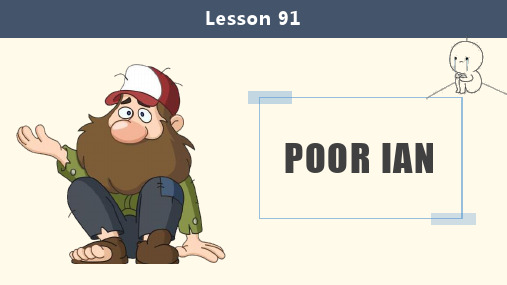
贫穷的
still miss person
move
neighbour
poor
--Who wanted to sell the house?
--Ian’s wife.
Poor Ian!
Catherine: Has Ian sold his house yet? Jenny: Yes, he has. He sold it last week.
Linda: Will you see- JIaimn dtioddn’at yd,riJnkenwnayte?r, did he?
- No, he didn’t. 是的,他不想。
Jenny: Yes, I will. -Yes, he did. 不,他想。 Linda: Please give hi本 逻m册 辑m只 就y需 好r简,eLg单1a0r理3会d解s涉.反及意疑问句回答 Catherine: Poor Ian!
He didn't want to leave this house.
Jenny: No, he didn't want to leave, but his wife did!
Poor Ian!
Catherine: Has Ian _s_o_ld_his house yet? Jenny: Yes, he has. He sold it last week.
Catherine: When will the new people move into this house?
Poor Ian!
后C天a:thteheridnaey: aHftaesr Itoamnosroroldw his house yet? 后天早上:Jtehnenidnya:tyhYaeefmtse,orrhnteoinmghoarsr.owHe sold it last week. 后天下C午at:htehreinidneaty:hHaefaatesftrhetreonmomooonrrvoewd to his new house yet? 后天晚上:Jtheenndyay: Nafote, rntootmyoerrto.wHe's still here. 后天夜里:the innigthhHteaeef'vtseenrginongienxgt to move tomorrow.
still miss person
move
neighbour
poor
--Who wanted to sell the house?
--Ian’s wife.
Poor Ian!
Catherine: Has Ian sold his house yet? Jenny: Yes, he has. He sold it last week.
Linda: Will you see- JIaimn dtioddn’at yd,riJnkenwnayte?r, did he?
- No, he didn’t. 是的,他不想。
Jenny: Yes, I will. -Yes, he did. 不,他想。 Linda: Please give hi本 逻m册 辑m只 就y需 好r简,eLg单1a0r理3会d解s涉.反及意疑问句回答 Catherine: Poor Ian!
He didn't want to leave this house.
Jenny: No, he didn't want to leave, but his wife did!
Poor Ian!
Catherine: Has Ian _s_o_ld_his house yet? Jenny: Yes, he has. He sold it last week.
Catherine: When will the new people move into this house?
Poor Ian!
后C天a:thteheridnaey: aHftaesr Itoamnosroroldw his house yet? 后天早上:Jtehnenidnya:tyhYaeefmtse,orrhnteoinmghoarsr.owHe sold it last week. 后天下C午at:htehreinidneaty:hHaefaatesftrhetreonmomooonrrvoewd to his new house yet? 后天晚上:Jtheenndyay: Nafote, rntootmyoerrto.wHe's still here. 后天夜里:the innigthhHteaeef'vtseenrginongienxgt to move tomorrow.
新概念一 lesson91-92 (完整版)
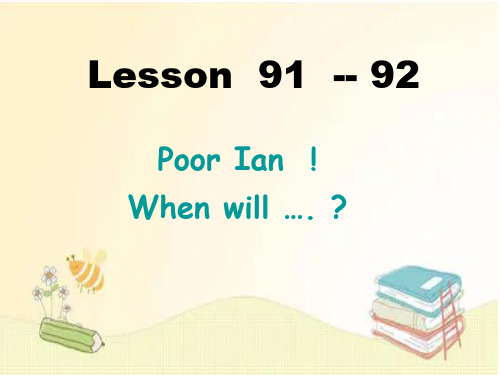
New words and expressions
• poor [ puE ]
adj.
3)笨拙的,差劲的
poor jokes 差劲的笑话
a poor excuse 笨拙的借口
New words and expressions
• poor [ puE ]
adj.
3)笨拙的,差劲的 sth
be poor at 不擅长….. doing sth eg: My daughter is poor at swimming.
( D)7.Mr smith _______________to Tokyo and he will be back in
a week • A. has been B. has visited C. has sent D. has gone
( B)8.They___________________ China for two years
Lesson 91 -- 92
Poor Ian ! When will …. ?
new words
• 1 believe [bi'li:v] v.相信,认为 • 7 because [bi'kɔz] conj.因为
• 2 may [mei] (用于请求许可)可以 • 8 retire [ri'taiə] v.退休
new words
New words
still [ stil ]
person [ `pE:sEn ]
adv.还,仍旧 move [mu:v ]
v.搬家 miss [ mis ]
n.人 people [ `pi:pEl]
n.人们
v.想念,思念
poor [ puE ]
新概念英语第一册91-92课-完整ppt

He is a nice/good person. • 他是个好人。 • in person • 亲自,直接的 • He will go to get the money in person. • 他将亲自去取钱。 • personal • adj. 个人的,私人的 • a personal letter
OK,has Ian sold his house?Maybe yes,maybe no,has he moved to a new house? Now let`s listen to the audio and see if you can answer the question"Who wanted to sell the house?"
Lesson 91Poo源自 Ian本课内容• 单词学习 • 课文讲解 • 练习 • 日常用语 • 作业
Episode
If your father wants to go to the cinema,your mother wants to go shopping,what will they do?
• ★person n.(强调个体,不分男女老少,有复数persons) • The person in a hat is my father.
• ★people n.(强调集体,是集合名词) • How many people are there in your family? • person • n. 人
• He is sitting still. • 他一动不动地坐着。 • 病人安静地躺着。
• The patient is lying still.
• ★move v. 搬家;感动 • 这个故事感动了我。
• This story moves me. • move to 搬到……地方 • move in 搬进 • move out 搬出来 • move away 搬走 • 我们下个月将搬到乡下
OK,has Ian sold his house?Maybe yes,maybe no,has he moved to a new house? Now let`s listen to the audio and see if you can answer the question"Who wanted to sell the house?"
Lesson 91Poo源自 Ian本课内容• 单词学习 • 课文讲解 • 练习 • 日常用语 • 作业
Episode
If your father wants to go to the cinema,your mother wants to go shopping,what will they do?
• ★person n.(强调个体,不分男女老少,有复数persons) • The person in a hat is my father.
• ★people n.(强调集体,是集合名词) • How many people are there in your family? • person • n. 人
• He is sitting still. • 他一动不动地坐着。 • 病人安静地躺着。
• The patient is lying still.
• ★move v. 搬家;感动 • 这个故事感动了我。
• This story moves me. • move to 搬到……地方 • move in 搬进 • move out 搬出来 • move away 搬走 • 我们下个月将搬到乡下
(完整版)新概念第一册Lesson91-92
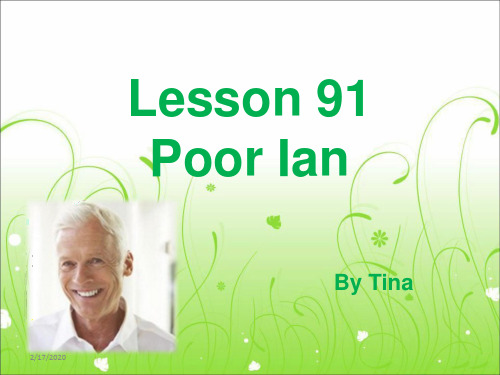
the people 民众,人民,国民 ②n. 民族 the English-speaking peoples 说英语的民族
person和people用法:
person 强调的个体的人, 可以有复数形式 persons
people 通常是人的统称, 单复数形式相同
★ poor [puə] adj. 可怜的
① v. 想念,惦念 • I missed you.
我想你
② v. 错过;未做到 • He overslept and missed his train. • 他睡过了头,错过了他那班火车。
• miss doing sth. 未能 I missed buying the magazine. 我未能买到那本杂志。
(4)表示说话前发生过一次或多次的动作,现 在成为一种经验,一般译为汉语“过”,
常带有twice , ever, never,three times 等 时间状语。
I have been to Beijing twice. 我去过北京两次。
不规则动词的过去式以及过去分词 巧记规律
• AAA: put– put –put let—let –let • ABA: become—became—become • ABB: stand—stood—stood • ABC: eat— ate—eaten
v. 想念,思念 n. 邻居 adv. 还,仍旧 v. 搬家 n. 人 adj. 可怜的 n. 人们
Grammar
• 复习:现在完成时
★ 现在完成时的用法:(1)现在完成时表示过 去某时发生的行为对主语目前产生的影响。即
用过去发生的某个行为来说明现在的某种情况。
• 肯定句式: 主语+have (has)+p.p • 否定句式: 主语+have (has)+not +p.p • 一般疑问句: Have (Has)+主语+p.p? • 特殊疑问句:
person和people用法:
person 强调的个体的人, 可以有复数形式 persons
people 通常是人的统称, 单复数形式相同
★ poor [puə] adj. 可怜的
① v. 想念,惦念 • I missed you.
我想你
② v. 错过;未做到 • He overslept and missed his train. • 他睡过了头,错过了他那班火车。
• miss doing sth. 未能 I missed buying the magazine. 我未能买到那本杂志。
(4)表示说话前发生过一次或多次的动作,现 在成为一种经验,一般译为汉语“过”,
常带有twice , ever, never,three times 等 时间状语。
I have been to Beijing twice. 我去过北京两次。
不规则动词的过去式以及过去分词 巧记规律
• AAA: put– put –put let—let –let • ABA: become—became—become • ABB: stand—stood—stood • ABC: eat— ate—eaten
v. 想念,思念 n. 邻居 adv. 还,仍旧 v. 搬家 n. 人 adj. 可怜的 n. 人们
Grammar
• 复习:现在完成时
★ 现在完成时的用法:(1)现在完成时表示过 去某时发生的行为对主语目前产生的影响。即
用过去发生的某个行为来说明现在的某种情况。
• 肯定句式: 主语+have (has)+p.p • 否定句式: 主语+have (has)+not +p.p • 一般疑问句: Have (Has)+主语+p.p? • 特殊疑问句:
新概念英语第一册lesson91-92课件

★miss v. 想念,思念 ① v. 想念,惦念 • I miss you. ② v. 错过 他起晚了,错过了那班火车。 • He got up late and missed that train.
• • • •
★ person n.人 (强调个体,不分男女老少,有复数persons) The person in a hat is my father. He is a nicБайду номын сангаас/good person.他是个好人。
• He is going to paint this bookcase tomorrow. • I am going to spend the holiday next week. • They are going to buy some fruit this evening. be going to do 计划/打算做某事,表将来 • • • • He will go to America tomorrow. I will buy a car next year. They will have a party tomorrow evening. will do 将要……,表将来
you see Ian today, Jenny? Jenny: Yes, I will. Linda:Please give him my regards. Catherine: Poor Ian! He didn't want to leave this house. Jenny: No, he didn't want to leave, but his wife did.
一般将来时
表示将来将要发生的动作或事情 be going to do 计划/打算做……
Lesson9192(课件)新概念英语第一册(5)
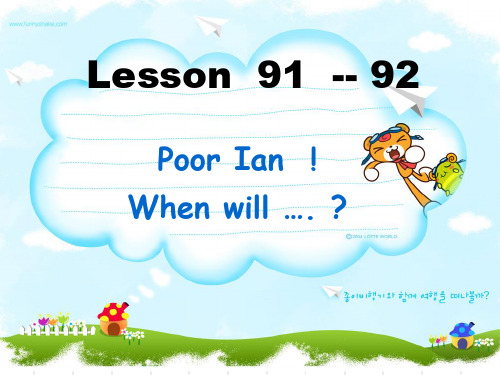
New words and expressions
miss [ mis ] 2)v.注意到……的不在 eg:When did you miss your bag? 你多久之后回来?
New words and expressions
miss [ mis ] 3)v.错过,失去机会 eg:I missed a good chance. 我失去一次机会。 eg:They missed the bus and walk home. 他们没有赶上公汽就走回家了。
person [ `pE:sEn ] n.人 引申词:personal adj. 个人的,私人的 a personal letter 私人信件 a personal conversation 私人谈话
New words and expressions
New words and expressions
neighbour[ `neibE ] n.邻居 eg: He and I are next-door neighbours. 他和我比邻而居。 a good neighbour 好邻居
New words and expressions
poor [ puE ] adj. 2)贫穷的 引申词:rich adj.富有的 a poor man 贫穷的人 a poor village 贫穷的村庄 the poor 穷人(用作复数) eg:We should help the poor. 我们应该帮助穷人。
New words and expressions
move [mu:v ] move to 搬家,移动move in 搬进(强调结果)move into 搬进(强调过程)move out 搬出
New words and expressions
新概念英语第一册91-92课最新版本ppt课件

最新版整理ppt
11
一般将来时
• 一般将来时表示将来某一时刻的动作或状 态,或将来某一段时间内经常的动作或状
态。常常和表示将来的时间状语连用。如: tomorrow(明天), next week(下周), from now on(从现在开始);in the future (将来)等。 一般将来时由助动词shall (第一人称),will(第二、三人称) 动词
最新版整理ppt
22
将来时的时间状语
CATHERING: When? Tomorrow morning?
JENNY: No. Tomorrow afternoon.
I'll miss him. 思念,想念 错过
have / has been + 形容词 “一直都很…”
He has always been a good neighbour.
原形:sell 过去 现在完成时的标志词
CATHERING: Has 式Ian:soslodldhis house yet?
JENNY: Yes, he has. 表示过去的时间状语
He sold it last week.
CATHERING: Has he moved to his new house yet?
未能
I missed buying the magazine. 我未能买到那本杂志。
I missed seeing him yesterday. 昨天我未能/没看见他。
③注意到…的不存在
• When did you miss your bag? • 你什么时候发现提包不见的?
poor
dj. ①可怜的 he poor old woman had no one to talk to. 那个可怜的老人找不到人跟她说话。 ②贫穷的 rich poor man 贫穷的人 he poor 穷人 We should help the poor. ③笨拙的,差劲的 e good at sth./be good at doing sth.
新概念英语第一册Lesson9192课件

I missed an opportunity of realizing my
dream. 我错过了一个可能实现自己梦想的机会。
★person n. 人 personal adj. 个人的 personality 个性 in person 亲自 personality manager 人事管理 者
No, 主+won’t. 特殊疑问句:
特殊疑问词 + will +主语 + do +其他? 第一人称 I/we shall +V原 will not=won't shallYou can’t swim,
can you?
你不会游泳,
是吗?
It’s so hot,
isn’t it?
真热啊,
不是吗?
Our teacher is nice,
isn’t she?
我们老师真好啊, ↓
不是吗? ↓
前句
后句
陈述句
疑问句
两大原则:前肯后否,前否后肯
前句中有否定词(no, never, hardly, few, little, nothing, nobody, seldom等)时,后句用肯定 若前句没有be动词,助动词,情态动词,则后句借用do, does,did
CATHERING:When will the new people move into this house?
JENNY:I think that they'll move in the day after tomorrow.
LINDA:Will you see Ian today, Jenny? JENNY:Yes, I will.
Thank you!
dream. 我错过了一个可能实现自己梦想的机会。
★person n. 人 personal adj. 个人的 personality 个性 in person 亲自 personality manager 人事管理 者
No, 主+won’t. 特殊疑问句:
特殊疑问词 + will +主语 + do +其他? 第一人称 I/we shall +V原 will not=won't shallYou can’t swim,
can you?
你不会游泳,
是吗?
It’s so hot,
isn’t it?
真热啊,
不是吗?
Our teacher is nice,
isn’t she?
我们老师真好啊, ↓
不是吗? ↓
前句
后句
陈述句
疑问句
两大原则:前肯后否,前否后肯
前句中有否定词(no, never, hardly, few, little, nothing, nobody, seldom等)时,后句用肯定 若前句没有be动词,助动词,情态动词,则后句借用do, does,did
CATHERING:When will the new people move into this house?
JENNY:I think that they'll move in the day after tomorrow.
LINDA:Will you see Ian today, Jenny? JENNY:Yes, I will.
Thank you!
Lesson91-92课件新概念英语第一册
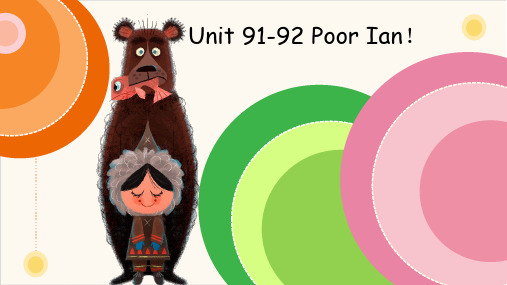
否定句: 主语 + won’t + 动词原形+将来时间
❌变否定
1.I will improve my writing skills. I won’t improve my writing skills.
2.He will go to the market tomorrow. He won’t go to the market tomorrow.
be going to
will do
be going to 使用的两种情况:
2.表示事先经过考虑, 安排好打算要做的事情。
如果出现计划、打算一般 都用be going to .
I am going to watch a film.
1.表示根据目前某种迹象 判断,某事非常有可能发生。
will 使用的三种情况:
It is Friday today.
It will be
Saturday tomorrow.
It will be rainy tomorrow.
adj.
She will be at home.
prep.
She will be 12 years old .
n.
be It will
rainy. 当句中没有实义动词时,我们需要在will 后加be动词,
1.表示单纯的 未来"将要", 通用各个人称.
They will go to visit the factory tomorrow.
2.表示不以人的 意志为转移的 自然发展的未 来的事。
He will be thirty years old this time next year.
3.问对方是否愿意 做某事或表示客气 地邀请或命令.
❌变否定
1.I will improve my writing skills. I won’t improve my writing skills.
2.He will go to the market tomorrow. He won’t go to the market tomorrow.
be going to
will do
be going to 使用的两种情况:
2.表示事先经过考虑, 安排好打算要做的事情。
如果出现计划、打算一般 都用be going to .
I am going to watch a film.
1.表示根据目前某种迹象 判断,某事非常有可能发生。
will 使用的三种情况:
It is Friday today.
It will be
Saturday tomorrow.
It will be rainy tomorrow.
adj.
She will be at home.
prep.
She will be 12 years old .
n.
be It will
rainy. 当句中没有实义动词时,我们需要在will 后加be动词,
1.表示单纯的 未来"将要", 通用各个人称.
They will go to visit the factory tomorrow.
2.表示不以人的 意志为转移的 自然发展的未 来的事。
He will be thirty years old this time next year.
3.问对方是否愿意 做某事或表示客气 地邀请或命令.
新概念英语第一册91-92课课件
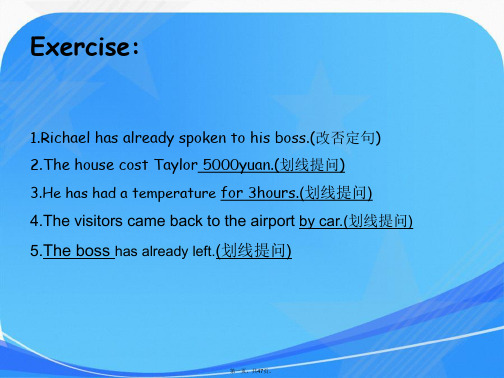
JENNY: No, not yet.
He’s still here.
将来时的时间状语
He’s going to move tomorrow.
be going to 打算做某事
第十七页,共47页。
move 的用法:
1. move home
搬家
Байду номын сангаас
2. move into + 宾语 搬入到…
3. move to + 宾语
昨天我和爸妈去了他们朋友家,我一点也不想去,可是他们很喜欢那里, 我们回来得很晚,所以就没时间写作业了。
哦,这样呀,那我等等你吧。
真的啊?那太好了! 我很快就写完了。你明天做什么呢? 我明天要去找我的朋友玩。
哦,我能和你一起去吗?
好呀!我们早上一起去吧!你快去写吧,游泳池五点就关门了!
好的好的,我这就去!
现在开始);in the future(将来)等。 一般 将来时由助动词shall(第一人称),will(第
二、三人称) 动词原形构成。美国英语则不 管什么人称,一律用will。
第十一页,共47页。
shall,Will的用法
在表达将来要发生的事情时,通常要用到shall
和will, shall一般与第一人称连用,will一般与
我未能买到那本杂志。 I missed seeing him yesterday.
昨天我未能/没看见他。
③注意到…的不存在
• When did you miss your bag?
• 你什么时候发现提包不见的?
第七页,共47页。
poor
dj. ①可怜的
he poor old woman had no one to talk to. 个可怜的老人找不到人跟她说话。
新概念英语第一册91-92课ppt课件
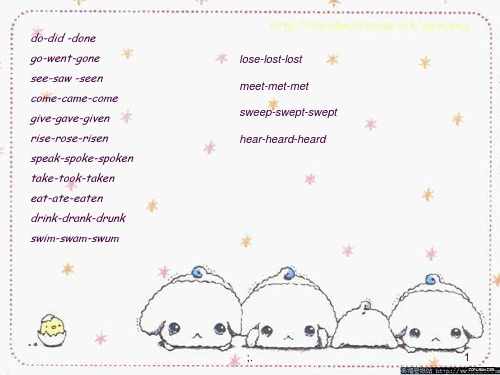
;.
5
neighbour n. 邻居 neighbourhood n.四邻,邻近地区 This is a quiet neighbourhood. 这一带很安静。 He is moving into the neighbourhood. 他要搬到这一带。 in the neighbourhood of 在…附近
• 一般将来时表示将来某一时刻的动作或状态,或将来某一段时间内经常的动作或状态。 常常和表示将来的时间状语连用。
• I will do my homework this evening. • Be+going to表示将来某时进行的状态或动作,或按预测将来会发生的事情。 • She'll be coming soon.
He’s still here.
He’s going to move tomorrow.
将来时的时间状语
be going to 打算做某事
;.
18
move 的用法:
1. move home
搬家
2. move into + 宾语 搬入到…
3. move to + 宾语
搬入到…
4. move in(不及物动词词组后不跟宾语) 搬入
;.
22
将来时的时间状语
CATHERING: When? Tomorrow morning?
JENNY: No. Tomorrow afternoon.
I'll miss him.
He has always been a good 思ne念igh,bo想ur念.
错过
LIDA: He's a very nice person. We'll all mishsahviem/. has been + 形容词 “一直都很…”
新概念英语第一册lesson9192

B: No, not yet. He’s still here. He’s going to move tomorrow.
A: When? Tomorrow morning? B: No. Tomorrow afternoon. I’ll miss him. He has always been a good neighbour .
A. No, you won’t B. No, you aren’t.
C. No, please don’t D. No, please.
• 8. – Where is the morning paper?
– I ________ if for you at once.
A. get B. am getting
A. isn’t working
B. doesn’t working
C. isn’t
going to working D. won’t work
3. He _____ very busy this week, he ______free next week.
A. will be; is B. is; is
I will not (won’t) shop. 3.否定句 直接在shall/will 后加not
Will not=won’t
Will you shop? 4.将shall/will提前并大写。(主语是第一人称I 或we时,I 或we变you),句末变问号。
Yes, I will. No, I won’t.
改写句子
1)Tom is going to go hiking.(改否定句)
Tom
going to go hiking.
2)I’ll help them.(改否定句)
A: When? Tomorrow morning? B: No. Tomorrow afternoon. I’ll miss him. He has always been a good neighbour .
A. No, you won’t B. No, you aren’t.
C. No, please don’t D. No, please.
• 8. – Where is the morning paper?
– I ________ if for you at once.
A. get B. am getting
A. isn’t working
B. doesn’t working
C. isn’t
going to working D. won’t work
3. He _____ very busy this week, he ______free next week.
A. will be; is B. is; is
I will not (won’t) shop. 3.否定句 直接在shall/will 后加not
Will not=won’t
Will you shop? 4.将shall/will提前并大写。(主语是第一人称I 或we时,I 或we变you),句末变问号。
Yes, I will. No, I won’t.
改写句子
1)Tom is going to go hiking.(改否定句)
Tom
going to go hiking.
2)I’ll help them.(改否定句)
Lesson9192(课件)新概念英语第一册(1)

13. Ask me if the new people will move in this afternoon? Will the new people move in this afternoon?
14. Ask me if Jenny will see Ian today? Will Jenny see Ian today?
He’s going to move tomorrow. be going to do 计划、打算做某事。
I’ll miss him. = I will miss him. I miss home very much. He missed the train yesterday. I miss you because I missed you.
of the room. 他们把课桌移到了房间的左边。
miss /mis/ v. 想念,思念
1)想念,思念 eg. We will miss you if you move.
如果你搬家了,我们会想你的。 I really miss my hometown. 我真的很想念我的家乡。 2)错过 We missed the bus. 我们错过了那辆公车。
• -He didn’t want to leave this house. • -No, he didn’t, but his wife did! 反意疑问句: -He didn’t go to school yesterday, did he? -No, he didn’t.(是的,他没去。)
neighbour /5neib[/ n. 邻居
eg. He and I are neighbours. 他和我是邻居。
neighbourhood 四邻,邻近地区 eg. This is a quiet neighbourhood.
14. Ask me if Jenny will see Ian today? Will Jenny see Ian today?
He’s going to move tomorrow. be going to do 计划、打算做某事。
I’ll miss him. = I will miss him. I miss home very much. He missed the train yesterday. I miss you because I missed you.
of the room. 他们把课桌移到了房间的左边。
miss /mis/ v. 想念,思念
1)想念,思念 eg. We will miss you if you move.
如果你搬家了,我们会想你的。 I really miss my hometown. 我真的很想念我的家乡。 2)错过 We missed the bus. 我们错过了那辆公车。
• -He didn’t want to leave this house. • -No, he didn’t, but his wife did! 反意疑问句: -He didn’t go to school yesterday, did he? -No, he didn’t.(是的,他没去。)
neighbour /5neib[/ n. 邻居
eg. He and I are neighbours. 他和我是邻居。
neighbourhood 四邻,邻近地区 eg. This is a quiet neighbourhood.
相关主题
- 1、下载文档前请自行甄别文档内容的完整性,平台不提供额外的编辑、内容补充、找答案等附加服务。
- 2、"仅部分预览"的文档,不可在线预览部分如存在完整性等问题,可反馈申请退款(可完整预览的文档不适用该条件!)。
- 3、如文档侵犯您的权益,请联系客服反馈,我们会尽快为您处理(人工客服工作时间:9:00-18:30)。
• No, he has not moved to his new house yet.
• He’s still here. = He is still here. • 副词still也可用于一般现在时,注意位
置在be动词之后。 • He’s going to move tomorrow. • be going to do 计划、打算做某事。 • I’ll miss him. = I will miss him • I miss home very much. • He missed the train yesterday. • I miss you because I missed you.
•
We'll all miss him.
• CATHERINE:When will the new people move into this house?
• JENNY:I think that they'll move in the day after tomorrow.
• LINDA:Will you see Ian today, Jenny?
• JENNY:Yes, I will.
• LINDA:Please give him my regards.
• CATHERINE:Poor Ian!
•
He didn't want to leave this house
• JENNY •
:No, he didn't want to leave, but his wife did!
2019/12/3
• CATHERINE:When? Tomorrow morning?
• JENNY • •
:No. Tomorrow afternoon. I'll miss him. He has always been a good neighbour.
• LINDA:He's a very nice person.
He is a nice/good person. • 他是个好人。 • in person • 亲自,直接的 • He will go to get the money in person. • 他将亲自去取钱。 • personal • adj. 个人的,私人的 • a personal letter
课文讲解
• -Has he moved to his new house yet?
• -No, not yet. • Move to 搬到… • 我明天要搬到B区的办公室。
• I’ll move to the office in zone B tomorrow.
• Yet用于疑问句和否定句的句尾。
• poor
• adj. ①可怜的 • The poor old woman had no one to talk to. • 那个可怜的老人找不到人跟她说话。 • ②贫穷的 • a poor man • 贫穷的人 富裕的人 • the poor the rich • 穷人 • We should help the poor. • ③笨拙的,差劲的 • be good at sth./be good at doing sth. • be poor at sth./ be poor at doing sth. • 擅长于/不擅于…
lose-lost-lost meet-met-met sweep-swept-swept hear-heard-heard
Exercise:
1.Richael has already spoken to his boss.(改否定句) 2.The house cost Taylor 5000yuan.(划线提问) 3.He has had a temperature for 3hours.(划线提问) 4.The visitors came back to the airport by car.(划线提问) 5.The boss has already left.(划线提问)
• still • move • miss • neighbour • person • people • poor
单词学习
adv. 还,仍旧 v. 搬家 v. 想念,思念 n. 邻居 n. 人 ① adv. 还是,仍然
• 我仍然不知道他是什么意思。
• We'll move to the country next month.
★miss v. 想念,思念 ① v. 想念,惦念
• 我想你 • I missed you.
② v. 错过;未做到 • 他睡过了头,错过了他那班火车。 • He overslept and missed his train.
Welcome back!
1.Why does Nigel believe that the house is for sale? 2.How long has Ian lived there? 3.Why does Ian want to sell the house? 4.Why couldn`t Nigel decide? 5.Who has the last word in your family?
• He is sitting still. • 他一动不动地坐着。 • 病人安静地躺着。
• The patient is lying still.
• ★move v. 搬家;感动 • 这个故事感动了我。
• This story moves me. • move to 搬到……地方 • move in 搬进 • move out 搬出来 • move away 搬走 • 我们下个月将搬到乡下
Q&A
• 5.Is Ian a good neighbor ? • 6.Will Jenny see Ian today ? • 7. Did Ian want to leave this house ? • 8. Who wanted to sell this house ? • 9.Will Jenny and Catherine miss Ian ?
• I still don’t understand what he meant. ② adv. 还要,甚至更
• 她上周看起来病得很严重,这周更严重了。
• She looked very ill last week and this week looks still worse. ③ adv. 静止地;安静地
相同people
• When will the new people move into this house?
• move to = move into 搬进。 • people = neighbours • 她是这个职位的合适人选。 • She’s the right person for this job. • 公园里有很多人。 • There’re a lot of people in the park.
Lesson 91
Poor Ian
本课内容
• 单词学习 • 课文讲解 • 练习 • 日常用语 • 作业
Episode
If your father wants to go to the cinema,your mother wants to go shopping,what will they do?
• ★person n.(强调个体,不分男女老少,有复数persons) • The person in a hat is my father.
• ★people n.(强调集体,是集合名词) • How many people are there in your family? • person • n. 人
2019/12/3
• CATHERINE:Has Ian sold his house yet?
• JENNY •
:Yes, he has. He sold it last week.
• CATHERINE:Has he moved to his new
•
house yet?
• JENNY •
:No, not yet. He's still here. He's going to move tomorrow.
• 1.Has Ian sold his house yet ? • 2.When did Ian sell his house ? • 3.Has Ian moved to his new house yet ? • 4.When will he move to his new house ?
2019/12/3
2019/12/3
• neighbour
• n. 邻居 • neighbourhood • n.四邻,邻近地区 • This is a quiet neighbourhood. • 这一带很安静。 • He is moving into the neighbourhood. • 他要搬到这一带。 • in the neighbourhood of 在…附近
OK,has Ian sold his house?Maybe yes,maybe no,has he moved to a new house? Now let`s listen to the audio and see if you can answer the question"Who wanted to sell the house?"
Review
believe may how long since why sell because retire cost pound worth penny
v. 相信,认为 可以
多长
prep. 自从 adv. 为什么 v. 卖,出售 conj. 因为 v. 退休 v. 花费 n. 英镑 prep. 值……钱
• He’s still here. = He is still here. • 副词still也可用于一般现在时,注意位
置在be动词之后。 • He’s going to move tomorrow. • be going to do 计划、打算做某事。 • I’ll miss him. = I will miss him • I miss home very much. • He missed the train yesterday. • I miss you because I missed you.
•
We'll all miss him.
• CATHERINE:When will the new people move into this house?
• JENNY:I think that they'll move in the day after tomorrow.
• LINDA:Will you see Ian today, Jenny?
• JENNY:Yes, I will.
• LINDA:Please give him my regards.
• CATHERINE:Poor Ian!
•
He didn't want to leave this house
• JENNY •
:No, he didn't want to leave, but his wife did!
2019/12/3
• CATHERINE:When? Tomorrow morning?
• JENNY • •
:No. Tomorrow afternoon. I'll miss him. He has always been a good neighbour.
• LINDA:He's a very nice person.
He is a nice/good person. • 他是个好人。 • in person • 亲自,直接的 • He will go to get the money in person. • 他将亲自去取钱。 • personal • adj. 个人的,私人的 • a personal letter
课文讲解
• -Has he moved to his new house yet?
• -No, not yet. • Move to 搬到… • 我明天要搬到B区的办公室。
• I’ll move to the office in zone B tomorrow.
• Yet用于疑问句和否定句的句尾。
• poor
• adj. ①可怜的 • The poor old woman had no one to talk to. • 那个可怜的老人找不到人跟她说话。 • ②贫穷的 • a poor man • 贫穷的人 富裕的人 • the poor the rich • 穷人 • We should help the poor. • ③笨拙的,差劲的 • be good at sth./be good at doing sth. • be poor at sth./ be poor at doing sth. • 擅长于/不擅于…
lose-lost-lost meet-met-met sweep-swept-swept hear-heard-heard
Exercise:
1.Richael has already spoken to his boss.(改否定句) 2.The house cost Taylor 5000yuan.(划线提问) 3.He has had a temperature for 3hours.(划线提问) 4.The visitors came back to the airport by car.(划线提问) 5.The boss has already left.(划线提问)
• still • move • miss • neighbour • person • people • poor
单词学习
adv. 还,仍旧 v. 搬家 v. 想念,思念 n. 邻居 n. 人 ① adv. 还是,仍然
• 我仍然不知道他是什么意思。
• We'll move to the country next month.
★miss v. 想念,思念 ① v. 想念,惦念
• 我想你 • I missed you.
② v. 错过;未做到 • 他睡过了头,错过了他那班火车。 • He overslept and missed his train.
Welcome back!
1.Why does Nigel believe that the house is for sale? 2.How long has Ian lived there? 3.Why does Ian want to sell the house? 4.Why couldn`t Nigel decide? 5.Who has the last word in your family?
• He is sitting still. • 他一动不动地坐着。 • 病人安静地躺着。
• The patient is lying still.
• ★move v. 搬家;感动 • 这个故事感动了我。
• This story moves me. • move to 搬到……地方 • move in 搬进 • move out 搬出来 • move away 搬走 • 我们下个月将搬到乡下
Q&A
• 5.Is Ian a good neighbor ? • 6.Will Jenny see Ian today ? • 7. Did Ian want to leave this house ? • 8. Who wanted to sell this house ? • 9.Will Jenny and Catherine miss Ian ?
• I still don’t understand what he meant. ② adv. 还要,甚至更
• 她上周看起来病得很严重,这周更严重了。
• She looked very ill last week and this week looks still worse. ③ adv. 静止地;安静地
相同people
• When will the new people move into this house?
• move to = move into 搬进。 • people = neighbours • 她是这个职位的合适人选。 • She’s the right person for this job. • 公园里有很多人。 • There’re a lot of people in the park.
Lesson 91
Poor Ian
本课内容
• 单词学习 • 课文讲解 • 练习 • 日常用语 • 作业
Episode
If your father wants to go to the cinema,your mother wants to go shopping,what will they do?
• ★person n.(强调个体,不分男女老少,有复数persons) • The person in a hat is my father.
• ★people n.(强调集体,是集合名词) • How many people are there in your family? • person • n. 人
2019/12/3
• CATHERINE:Has Ian sold his house yet?
• JENNY •
:Yes, he has. He sold it last week.
• CATHERINE:Has he moved to his new
•
house yet?
• JENNY •
:No, not yet. He's still here. He's going to move tomorrow.
• 1.Has Ian sold his house yet ? • 2.When did Ian sell his house ? • 3.Has Ian moved to his new house yet ? • 4.When will he move to his new house ?
2019/12/3
2019/12/3
• neighbour
• n. 邻居 • neighbourhood • n.四邻,邻近地区 • This is a quiet neighbourhood. • 这一带很安静。 • He is moving into the neighbourhood. • 他要搬到这一带。 • in the neighbourhood of 在…附近
OK,has Ian sold his house?Maybe yes,maybe no,has he moved to a new house? Now let`s listen to the audio and see if you can answer the question"Who wanted to sell the house?"
Review
believe may how long since why sell because retire cost pound worth penny
v. 相信,认为 可以
多长
prep. 自从 adv. 为什么 v. 卖,出售 conj. 因为 v. 退休 v. 花费 n. 英镑 prep. 值……钱
